By: Patrick W. Zimmerman
How we talk about violence is indicative of how we think about it, a window into the underlying sociocultural underpinnings of our political discourse.
Terrorist. Lone wolf.
Mass shooting. Attack.
Radicalized. Disturbed.
The US is in a particularly charged political moment, every act we perceive filtered through the habitus of our increasingly isolated and polarized social bubbles, every news story positioned relative to the context of our ongoing articulation of race, religion, national identity, justice, and perceived history. We may make up our own minds about how to react to the news of horrifying acts of terrorism, but we do not operate free from that context.
Translation: How we talk about terrorism says a lot about how we think about race, violence, and national identity.
So, let’s break it down, shall we? I took the public statements and tweets from 6 prominent Republicans and 6 Democrats about 11 mass shootings in the US, from Charleston Church shootings through Las Vegas. I then compared them, using the magic of computational linguistics.
The question
Is there a difference in how prominent Republicans and Democrats talk about mass shootings, and does that vary by the race of the shooter?
The short-short version
Yup. And oh, yeah, it does.
The Republicans in my sample were roughly twice as likely to mention terrorism than Democrats, and they did not once use the term with a white shooter (Democrats did so a whopping 3 times). The Democrats, on the other hand, seem to be as focused on gun violence as one would expect, with the Republicans barely mentioning that firearms were used at all. Remarkable, given our sample set of terrorist incidents is restricted to mass shootings.
On the unexpeced side, “lone wolf” might be used by the media to primarily describe white terrorists, but it is used to describe non-white terrorists by our sample of politicians. Which was a quite the surprise.
The methodology
In a hurry? Jump to the results!
I gathered the publicly released statements by 6 Democrats and 6 Republicans regarding 10 mass shootings on US soil, from the shooting in Charleston, SC’s Rome Emmanuel Baptist Church in June 2015 to the Las Vegas shooting earlier this month.
Note: to keep the discourse relatively narrow, I only considered mass shootings, rather than other kinds of terrorism or political violence (vehicular attacks, arson, threats, or other hate crimes). This was primarily because, from the perspective of compiling and analyzing a linguistic corpus, the discourse surrounding, say, vehicular terrorism (Charlottesville, London, etc) is significantly different than that around gun violence, and patterns would be much harder to pick out of the resulting noise.
For my sample politicians, I focused on prominent members of each party active on social media while simultaneously trying to cover most of the ideological spectrum within each party.
| Team Donkey | Team Elephant |
|---|---|
| Hillary Clinton | Ted Cruz |
| Kamala Harris | John McCain |
| Barack Obama | Mitch McConnell |
| Nancy Pelosi | Marco Rubio |
| Bernie Sanders | Paul Ryan |
| Elizabeth Warren | Donald Trump |
Yes, yes. Bernie is technically an Indpendent. Are you about to make the argument that he doesn’t reflect and influence the discourse of an important segment of the Democratic Party? Please.
| Attack | Date | Shoter race | Killed (not incl. attacker) | Wounded |
|---|---|---|---|---|
| Charleston church | 2015-06-17 | White | 9 | 1 |
| Umpqua Comm. College | 2015-10-01 | White | 9 | 7-9 |
| Planned Parenthood | 2015-11-27 | White | 3 | 9 |
| San Bernardino | 2015-12-02 | Non-white | 14 | 24 |
| Orlando Pulse nightclub | 2016-06-12 | Non-white | 49 | 58 |
| Dallas police | 2016-07-07 | Non-white | 5 | 11 |
| Baton Rouge police | 2015-07-17 | Non-white | 3 | 3 |
| Ft. Lauderdale Airport | 2017-01-06 | Non-white | 5 | approx. 42 |
| Congressional baseball | 2017-06-14 | White | 0 | 6 |
| UPS | 2017-06-14 | Non-white | 3 | 0 |
| Las Vegas Strip | 2017-10-01 | White | 57 (as of publication) | 489 (as of publication) |
From each party’s text corpus, I then chose 200 significant n-grams to compare (limiting it primarily for chart readability), charting the same terms for both parties using a normalized TF-IDF calculation (to control for different document length), and comparing the Republican and Democrat corpora to the entire body of tweets by all Congressional and Senatorial Twitter accounts (compiled by CSPAN and used for our Trump Watch. It includes 594 accounts recorded back to 2016 Dec 23).
The text corpora and TF-IDF calculations files are available on our datasets and downloads page.
The surprise: “Lone wolf” is NOT commonly used by politicians to talk about white shooters
It’s only used in the dataset rarely (11 times overall). And then to refer to non-white terrorists.
Huh. Didn’t see that one coming.
This was such a surprise that I actually went back through the raw text files to make sure that I didn’t mislabel something or sort a statement about a white gunman into the non-white corpus. Nnnnope. There was not a single instance in the 35,278-word corpus of “lone wolf” being used to refer to a white terrorist, real or hypothetical. It has been used 10 times by Republicans and once by a Democrat in contexts like: “ISIL’s spokesman recently issued a call for lone wolf attacks against the West during Ramadan” (Mitch McConnell is particularly fond of the term).
This seems like a case of the term becoming a one-off talking point (used by both parties) surrounding the Orlando Pulse Nightclub shooting. While McConnell and Barack Obama (the lone instance of a Democrat in our set using the term) use it to refer to the attacks in Orlando, San Bernardino, Paris, and “Europe”, all uses of the term occur within a 10-day window after the Orlando shootings, and never again (in the subsequent 16 months covered by this study).
The total non-surprise: Politicians use much more unusual phrasing when talking about terrorism by non-whites, especially Republicans
Note: “Unusual” = Inverse Document Frequency. That is to say, the x-axis on all the dashboards and graphs in this article.
Members of both parties tended to use much more significant phrases (the right-hand side of the dashboard above) either more often (“comfort”, “terrorism”), or exclusively (“radicalization/radicalized/radicalizing”, “serious solution”, “lone wolf”, “radical Islamic terrorism”) when talking about incidents involving non-white shooters.
In contrast, when talking about white shooters, much more vanilla phrasing turned up, with the incident being declared a “tragedy” more than twice as often. Politicians of both parties spent more time talking about the “victim(s)” if the shooter was white.
Republicans name-drop ISIL/ISIS and talk about terrorism
Not a terrible surprise, as this fits well with both parties’ attitudes towards the concept of a Clash of Civilizations between The West and The Rest. Republicans generally embrace this worldview, seeing America as under attack by those who hate {insert myth of American values here}, while Democrats tend to hope fervently that if we stop being jerks to the rest of the world, we’ll be able to hug it all out and coexist peacefully with fair-trade lattes.
Democrats highlight access to guns, particularly for white shooters
To many on the Left, mass shootings are not just caused by guns, but by gun violence, a system-wide problem enabled by the gun lobby and solvable by making it harder to access deadly weapons. The theory goes that if Stephan Paddock had had, say, 2 AR-15s instead of 23 with him (and 26 more stashed at his residences), the number of dead and wounded at the Route 91 festival would have been far less.
Red vs. Blue: Democrats terms tend to be a bit more clustered and conventional, Republicans are a bit more all over the place
To put some numbers to it, the standard deviation of TF-IDF for each party:
- Democrats: σ = 0.1828
- Democrats: σ = 0.2469
At least on these few issues, terrorism and gun violence, the Democrats seem to be a little bit more unified than the Republicans. They also seem to be playing it a bit safer with their language.
The Republican Party is a bit all over the place when it comes to articulating their message in response to mass shootings. While they nearly universally avoid talking about guns, guns control, or the second amendment in the context of domestic tragedies, much of the rest of the Republican response seems a little bit off-message.
Given that Trump was one of the sampled Republicans, that probably shouldn’t be too much of a surprise.
What’s next?
There’s a lot of data here to mine, and this quick study only really scratches the surface. Possible follow-ups involve:
- Digging deeper into the lexicon of each party, breaking language down by (for example) category (i.e., talking about the shooter, talking about the victim, preventability of the incident, etc.).
- Expanding the pool of political accounts to look at to get a better feel for rank-and-file Republicans and Democrats.
- Looking at media depictions of events rather than those of politicians. Hypothesis: the “lone wolf is used to describe white men” received knowledge might play out here, rather than among politicians.
Most importantly, an ability to decode the manifestations of unequal treatment can help us know when and what to call out. That is to say, if we’re treating people differently, it’s good to know.
So we can fix it. Terrorism is terrorism, and call it that to its face.
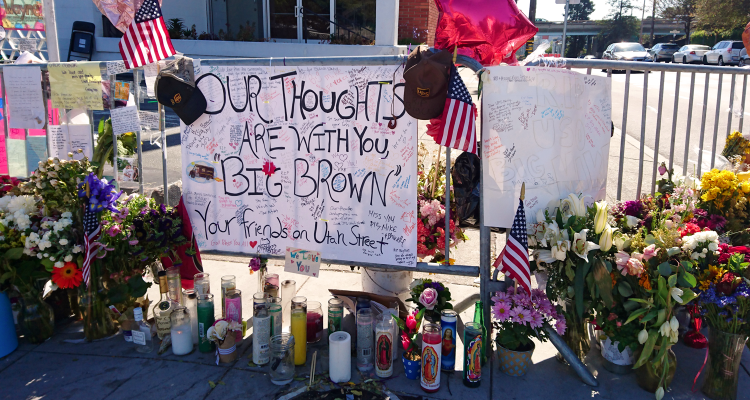

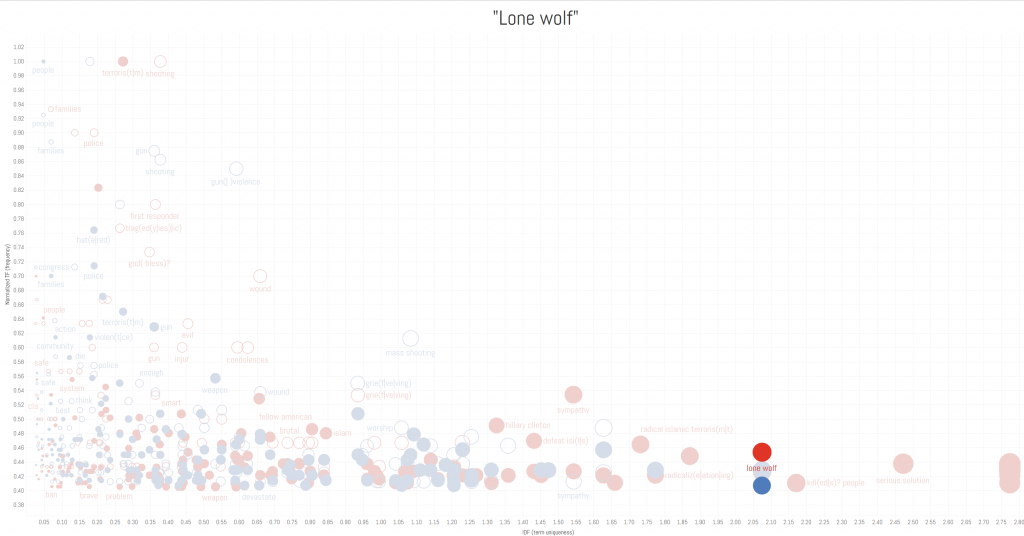
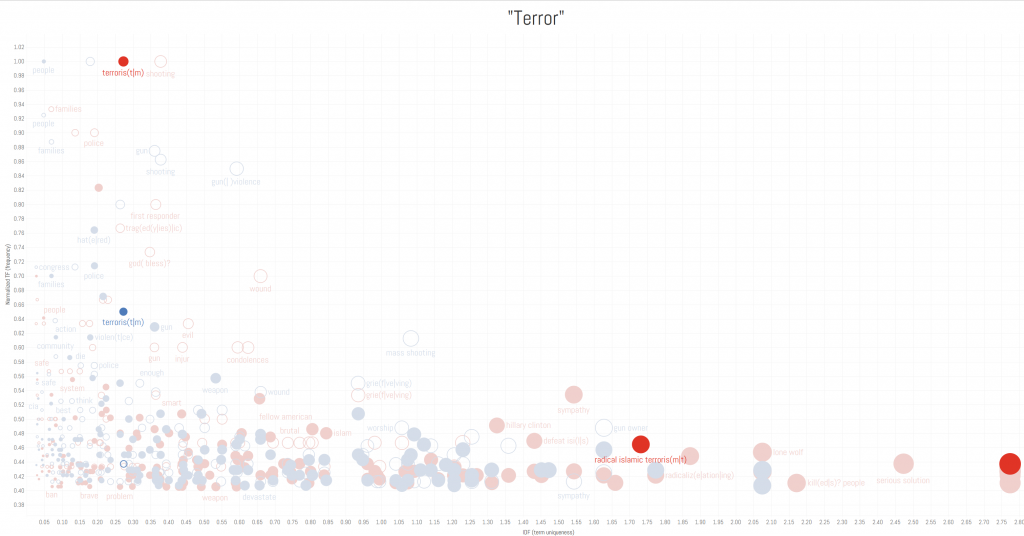
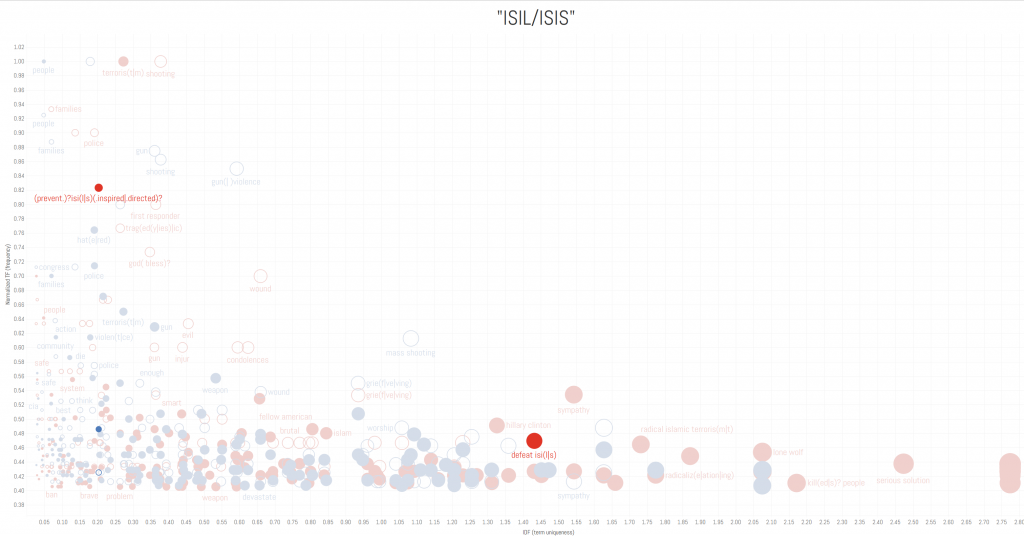
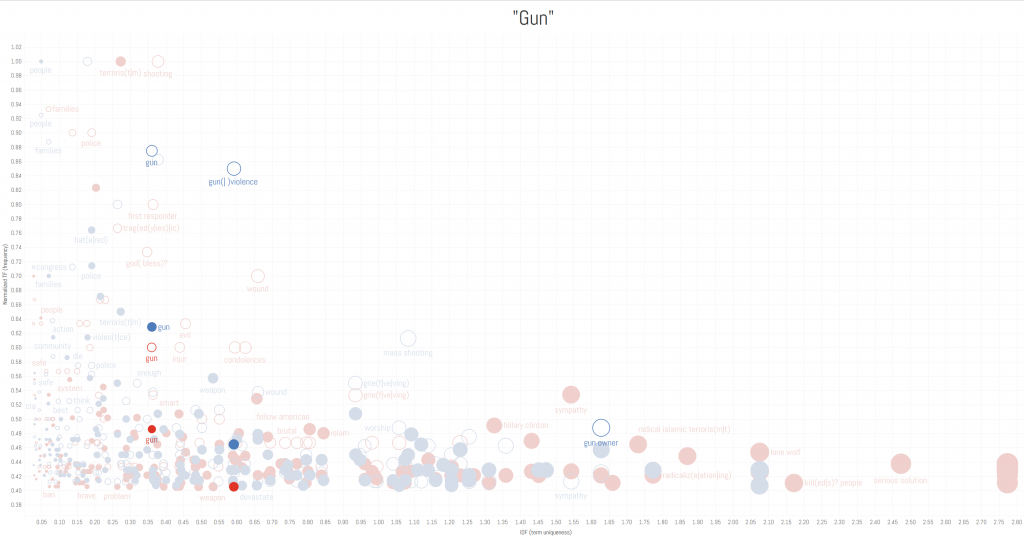
No Comments on "How does attacker race change the way Washington talks about mass shootings?"